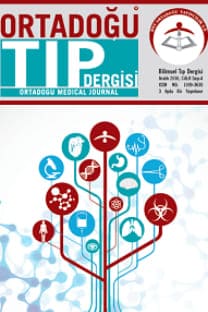Modifiye radikal mastektomi operasyonlarında anksiyetenin postoperatif ağrı beklentisi ve opioid tüketimi üzerine etkisi
modifiye radikal mastektomi, anksiyete, ağrı beklentisi
The effect of anxiety on postoperative pain expectation and opioid consumption in modified radical mastectomy operations
Modified radical mastectomy, Anxiety, expectation of pain,
___
- Stewart W, Wild CP. World Cancer Report 2014 - 28 Jan 2014 B. International Agency for Research on Cancer. Lyon: IARC Publications.
- Gagnon P, Massie MJ, Holland JC. The woman with breast cancer: Psychosocial considerations. Cancer Bulletin 1993; 45: 538-42.
- Baider L, Andritsch E, Uziely B, Ever-Hadani P, Goldzweig G, Hofmann G, et al. Do different cultural settings affect the psychological distress of women with breast cancer? A randomized study. Eur J Cancer Care (Engl) 2003; 12: 263-73.
- Özkan S, Alçalar N. Psychological responses to the surgical treatment of breast cancer. J Breast Health 2009; 5: 60-3.
- Mehnert A, Koch U. Prevalence of acute and post-traumatic stress disorder and comorbid mental disorders in breast cancer patients during primary cancer care: a prospective study. Psychooncology 2007; 16: 181-8.
- Tütüncü R, Günay H. Chronic pain, psychological factors and depression. Dicle Medical J 2011; 38: 257-62.
- Özalp G, Sarıoğlu R, Tuncel G, Aslan K, Kadıoğulları N. Preoperative emotional states in patients with breast cancer and postoperative pain. Acta Anaesthesiol Scand 2003; 47: 26-9.
- Liu SS, Wu CL. The effect of analgesic technique on postoperative patient-reported outcomes including analgesia: a systematic review. Anesth Analg 2007; 105: 789-808.
- Carr E, Thomas V. Anticipating and experiencing postoperative pain: the patient’s perspective. J Clin Nurs 1997; 6: 191-201.
- Sjöling M, Nordahl G. Patient satisfaction with postoperative pain management in spite of experiences of high levels of pain. Eur Nurse 1998; 3: 264-73.
- Aouad MT, Kanazi GE, Malek K, Tamim H, Zahreddine L, Kaddoum RN. Predictors of postoperative pain and analgesic requirements following abdominal hysterectomy: an observational study. J Anesth 2016; 30: 72-9.
- Ip Vivian HY, Abrishami A, Peng PW, Wong J, Chung F. Predictors of postoperative pain and analgesic consumption: a qualitative systematic review. Anesthesiology 2009; 111: 657-77.
- Svensson I, Sjöström B, Haljamae H. Influence of expectations and actual pain experiences on satisfaction with postoperative pain management. Eur J Pain 2001; 5: 125-33.
- Yücel A. Acute pain neurophysiology and the effect of postoperative pain on systems. PCA 1998: 4-24.
- Kehlet H, Jensen TS, Woolf CJ. Persistent postsurgical pain: Risk factors and prevention. Lancet 2006; 367: 1618-25.
- Bruce J, Thornton AJ, Powell R, Johnston M, Wells M, Heys SD, et al. Recovery Study Group. Psychological, surgical, and sociodemographic predictors of pain outcomes after breast cancer surgery: A population-based cohort study. Pain 2014; 155: 232-43.
- Kaunisto MA, Jokela R, Tallgren M, Kambur O, Tikkanen E, Tasmuth T, et al. Pain in 1,000 women treated for breast cancer: a prospective study of pain sensitivity and postoperative pain. Anesthesiology 2013; 119: 1410-21.
- Roomruangwong C, Tangwongchai S, Chokchainon A. Preoperative anxiety among patients who were about to receive uterine dilatation and curettage. J Med Assoc Thai 2012; 95: 1344-51.
- Mavridou P, Dimitriou V, Manataki A, Arnaoutoglou E, Papadopoulos G. Patient’s anxiety and fear of anesthesia: effect of gender, age, education, and previous experience of anesthesia. A survey of 400 patients. J Anesth 2013; 27: 104-8.
- Bruera E, Ripamonti C. Current status of patient-controlled analgesia in cancer patients. Oncology (Williston Park) 1997; 11: 373-84.
- Burgess C, Cornelius V, Love S, Graham J, Richards M, Ramirez A. Depression and anxiety in women with early breast cancer: five-year observational cohort study. BMJ 2005; 330: 702-5.
- Tenenbaum G, Furst D, Weingarten G. A statistical reevaluation of the STAI anxiety questionnaire. J Clin Psychol 1985; 41: 239-44.
- Özkan S. Psychiatric and Psychosocial Aspects of Cancer. Psychiatric Medicine: Counseling Liaison Psychiatry, 1994: s. 153-74.
- Gul A, Ustundag H, Andsoy II, Kalkanli S. Anxiety and pain in surgically treated breast cancer patients. Asian Pac J Cancer Prev 2015; 16: 4261-4.
- Robleda G, Sillero-Sillero A, Puig T, Gich I, Banos JE. Influence of preoperative emotional state on postoperative pain following orthopedic and trauma surgery. Rev Lat Am Enfermagem 2014; 22: 785-91.
- Kain ZN, Sevarino FB, Rinder C, et al. Preoperative anxiolysis and postoperative recovery in women undergoing abdominal hysterectomy. Anesthesiology 2001; 94: 415-22.
- Ali A, Altun D, Oguz BH, Ilhan M, Demircan F, Koltka K. The effect of preoperative anxiety on postoperative analgesia and anesthesia recovery in patients undergoing laparascopic cholecystectomy. J Anesth 2014; 28: 222-7.
- Doering BG. Postoperative pain and psychological factors. Doctor J 2009; 94-6.
- Momeni M, Crucitti M, De Kock M. Patient-controlled analgesia in the management of postoperative pain. Drugs 2006; 66: 2321-37.
- Yayın Aralığı: 4
- Başlangıç: 2009
- Yayıncı: MEDİTAGEM Ltd. Şti.
Erbin KANDEMİR, Tuğba AŞKIN, Tünay KANDEMİR, Gonca OĞUZ TUNCEL, Süheyla ÜNVER
Karotid endarterektomi sonrası karotid arter psödoanevrizması: olgu sunumu
Hatice KAPLANOĞLU, Osman BETON
Meltem ÖZDEMİR, Tahsin Rendan EDGÜER, Halil ÖZTÜRK, Emine ÖZTÜRK, Alper DİLLİ, Baki HEKİMOĞLU
Glomerülonefritli hastalarda böbrek parankiminin gerinim elastografi ile değerlendirilmesi
Mehmet BEYAZAL, Hatice Beyazal Polat, Fatma BEYAZAL ÇELİKER, Ekrem KARA, Arzu Turan, Mehmet Fatih İnecikli, Tuğba Eldeş
Solid meme kitlelerinin karakterize edilmesinde elastografinin rolü
Rasime Pelin KAVAK, Nazan ÇİLEDAĞ, Kemal Niyazi ARDA, Elif AKTAŞ, Füsun ARDIÇ
Yaşar TOPAL, Hatice TOPAL, Betül Battaloğlu İnanç
Akciğerin dev hücreli tümörü: cerrahi tedavi yönetimi
Funda İNCEKARA, Ebru SAYILIR GÜVEN, Şevki Mustafa DEMİRÖZ, Merve ŞENGÜL İNAN, Koray AYDOĞDU, Funda DEMİRAĞ, Selim Şakir Erkmen GÜLHAN, Sadi KAYA, Göktürk FINDIK
Difüz idiyopatik iskelet hiperostozu (DISH): klinik çalışma
Mustafa ÖĞDEN, Ulas YÜKSEL, Suleyman AKKAYA, Jonathan OPPONG, Üçler KISA, Bulent BAKAR, Mehmet Faik OZVEREN
Burak BURSALI, Serhat SAYIN, Ramazan GÖKDEMİR
İnkarsere Littre hernisi: Meckel divertikülünün nadir bir presentasyonu
